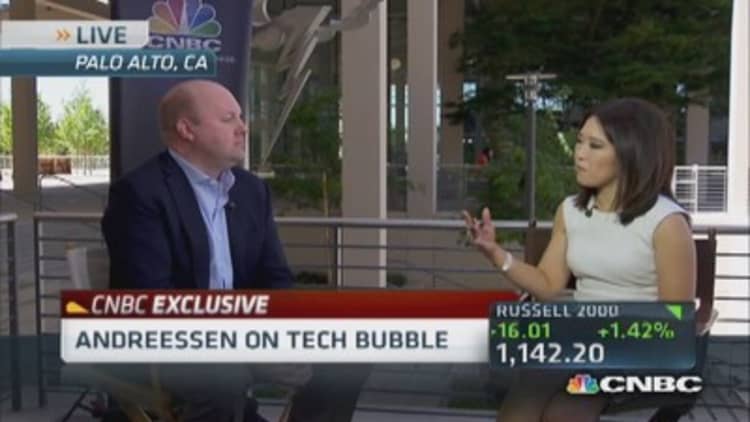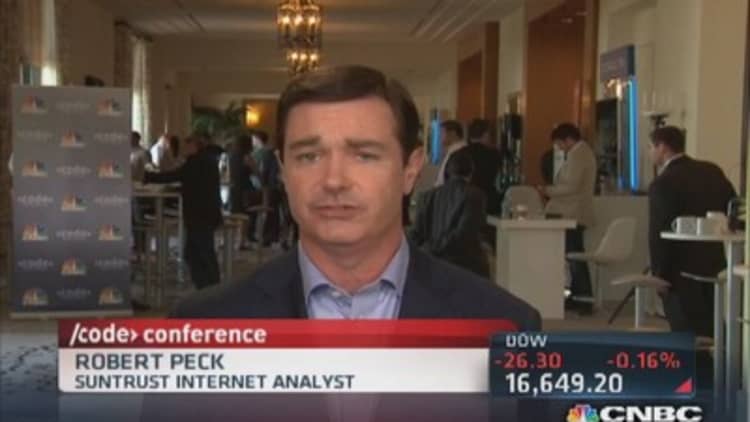Sky-high valuations of brand-new companies. Ridiculous real estate prices. Fights over neighborhood gentrification. Acquisitions with huge price tags. People in their 20s becoming overnight millionaires.
Signs that another speculative tech bubble is forming may be giving pause to investors—who've been abandoning much of the sector this year—but many analysts and VCs both in and near Silicon Valley (especially ones who remember the early 2000s), think that talk is at least early, if not overblown.
"History does not repeat—but it does rhyme," said Venky Ganesan, managing director at venture capital firm Menlo Ventures.

For sure, there are similarities to the late '90s, including high valuations, a lack of traditional metrics to determine a start-up's value and sky-high real estate prices in tech-heavy areas. But there are also enough differences to calm fears of a marketwide or societywide meltdown, Ganesan said.
Read MoreA new bubble? VC's say no
For one thing, most of the money at risk is VC and institutional money, not mom-and-pop investors. "The tourists haven't come yet," he said.
Ganesan likens the current climate to 1996—when Netscape went public—rather than 1999, by which time it was clear that retail investors' enthusiasm was irrational. Even the amount of VC money going into start-ups is actually far below what it was at the height of the bubble, he said.

Steve Blitz, chief economist at ITG, agrees that the current macro economic climate doesn't resemble the frenzy of the late '90s. Then the entire stock market was inflated—not just the tech sector—led by enormous capital expenditures. That mania trickled down to Main Street investors.
"Everybody and his mother owned stocks then," Blitz said.
Ultralow interest rates, which the Federal Reserve assures us are going to be around for a while, will almost certainly keep money flowing into the sector, reducing the likelihood of any investor panic, Blitz said.
Another important distinction: Plenty of tech companies, even relatively new ones, have credible business models in which they can make money. A fly-by-night company with no proven business plan will have a harder time getting backing this time out, said Noah Pittard, special counsel at law firm Cooley LLP.
"We learned one set of lessons about what doesn't work last time," he said. "The really stupid stuff isn't getting done."
The comparatively low cost of getting a company off the ground—server space is dramatically cheaper than it was then—means that the fallout of any start-up failing is much more limited, Pittard said.

Even the seemingly eye-popping real estate prices in San Francisco and Silicon Valley are at least partially the result of a decades-long failure of the state to keep up with population demands, said Mark Burns, a real estate agent based in Cupertino, California. Still, he doesn't think the 15 to 20 percent increase in prices every year over the past few years is sustainable forever.
"Sometimes you see [a sale] and say, 'wow, that's amazing,'" Burns said.
Read MoreBubble watch: A real estate story
ITG's Blitz said that even if the market contracts, a burst equity bubble doesn't generally level an economy the way a burst debt bubble does. Losses in the stock market, or in VC funds—even when very painful—don't generally devastate someone's life the way debt on a depreciating asset can.
None of which is to say that analyst aren't expecting a reckoning of some sort ("plenty of people are expecting a resetting," Pittard said). There are signs that investors' enthusiasm for cloud computing companies, for example, is dampening.
If VC investments hit the $75 billion range (they're about $28 billion to $30 billion today), or if retail investors return en masse, then perhaps investors may want to worry, said Ganesan.
But if anything the recovery after the last tech recession has dampened people's fears.
"We went through it a decade ago, and the world didn't end," Pittard said.
—By CNBC's Matt Hunter.


